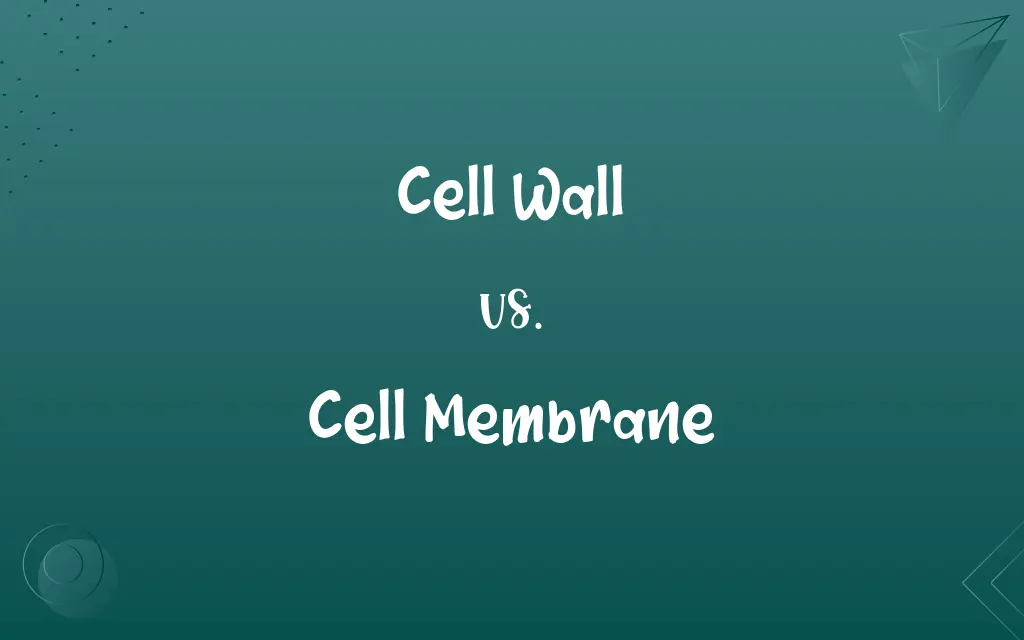Cell Wall vs. Cell Membrane: Know the Difference

By Shumaila Saeed || Updated on December 25, 2023
The cell wall is a rigid outer layer providing structure and protection, while the cell membrane is a flexible boundary controlling substance exchange.

Key Differences
The cell wall, primarily found in plants, fungi, and bacteria, is made of cellulose, chitin, or peptidoglycan. The cell membrane, present in all cell types, is a phospholipid bilayer with embedded proteins.
Shumaila Saeed
Dec 09, 2023
The cell wall provides structural support and protection, maintaining the cell's shape. The cell membrane regulates the entry and exit of substances, maintaining cellular homeostasis.
Shumaila Saeed
Dec 09, 2023
The cell wall is relatively permeable, allowing water, gases, and small molecules to pass through. The cell membrane is selectively permeable, controlling the movement of substances based on size, charge, and solubility.
Shumaila Saeed
Dec 09, 2023
The cell wall is rigid and gives cells a fixed shape. In contrast, the cell membrane is flexible, allowing for cell movement and shape change.
Shumaila Saeed
Dec 09, 2023
The cell wall is present in plant cells, bacteria, and fungi, but absent in animal cells. The cell membrane is a universal component of all living cells.
Shumaila Saeed
Dec 09, 2023
ADVERTISEMENT
Comparison Chart
Composition
Made of cellulose, chitin, or peptidoglycan
Phospholipid bilayer with embedded proteins
Shumaila Saeed
Dec 09, 2023
Function
Provides structural support and protection
Regulates entry and exit of substances
Shumaila Saeed
Dec 09, 2023
Presence in Cell Types
In plants, bacteria, fungi; absent in animals
Universal in all living cells
Shumaila Saeed
Dec 09, 2023
ADVERTISEMENT
Cell Wall and Cell Membrane Definitions
Cell Wall
The cell wall is a permeable layer allowing passage of substances.
Water travels through the cell wall during osmosis.
Shumaila Saeed
Dec 02, 2023
Cell Membrane
Cell membrane allows communication and interaction with the external environment.
Hormone signals are received by receptors on the cell membrane.
Shumaila Saeed
Dec 02, 2023
Cell Wall
The cell wall is a rigid, protective outer layer found in plant, fungal, and bacterial cells.
The cell wall of the plant cell maintains its rectangular shape.
Shumaila Saeed
Dec 02, 2023
Cell Membrane
Cell membrane consists of a lipid bilayer with proteins for transport.
Oxygen passes through the cell membrane via diffusion.
Shumaila Saeed
Dec 02, 2023
Cell Wall
Cell wall refers to a structure providing mechanical support to cells.
The cell wall in bacteria is essential for preventing cell lysis.
Shumaila Saeed
Dec 02, 2023
ADVERTISEMENT
Cell Membrane
The cell membrane is a flexible, semipermeable barrier surrounding the cell.
The cell membrane controls the nutrients entering the cell.
Shumaila Saeed
Dec 02, 2023
Cell Wall
Cell wall is composed of cellulose in plants, chitin in fungi, or peptidoglycan in bacteria.
The strength of the plant's cell wall comes from its cellulose content.
Shumaila Saeed
Dec 02, 2023
Cell Membrane
The cell membrane is vital for cellular processes like endocytosis and exocytosis.
The cell membrane envelops food particles during endocytosis.
Shumaila Saeed
Dec 02, 2023
Cell Wall
The cell wall is a non-living part that gives shape to plant cells.
The rigid cell wall helps leaves maintain their flat structure.
Shumaila Saeed
Dec 02, 2023
Cell Membrane
The cell membrane maintains the cell's internal environment.
The cell membrane keeps the cell's internal conditions stable.
Shumaila Saeed
Dec 02, 2023
Repeatedly Asked Queries
What is a cell membrane?
The cell membrane, or plasma membrane, is a biological membrane that separates the interior of all cells from the outside environment, controlling the movement of substances in and out of cells.
Shumaila Saeed
Dec 09, 2023
Do cell walls aid in cell communication?
While they provide structural support, cell walls are not primarily involved in cell communication, which is more a function of the cell membrane.
Shumaila Saeed
Dec 09, 2023
Can the cell membrane repair itself?
Yes, the cell membrane has the ability to self-repair if it gets damaged, a property not shared by the cell wall.
Shumaila Saeed
Dec 09, 2023
What is the primary function of the cell wall?
The primary function of the cell wall is to provide rigidity, strength, and protection against mechanical stress and osmotic pressure.
Shumaila Saeed
Dec 09, 2023
What are cell walls made of?
Cell walls are primarily made of carbohydrates like cellulose in plants, chitin in fungi, and peptidoglycan in bacteria.
Shumaila Saeed
Dec 09, 2023
Are cell walls present in animal cells?
No, animal cells do not have cell walls; they only have a cell membrane.
Shumaila Saeed
Dec 09, 2023
What is the main role of the cell membrane?
The cell membrane's main role is to regulate the entry and exit of substances, maintaining the cell's internal balance and communication with its environment.
Shumaila Saeed
Dec 09, 2023
Is the cell membrane involved in energy production?
Indirectly, yes. The cell membrane's structure and proteins play a key role in cellular processes like respiration and photosynthesis that produce energy.
Shumaila Saeed
Dec 09, 2023
What is a cell wall?
The cell wall is a rigid, protective layer outside the cell membrane in plants, fungi, bacteria, and some protists, providing structure and support.
Shumaila Saeed
Dec 09, 2023
Can the cell wall help in defense against pathogens?
Yes, the cell wall can act as a barrier to protect against pathogens and physical damage.
Shumaila Saeed
Dec 09, 2023
Do all plant cells have cell walls?
Yes, virtually all plant cells have cell walls made of cellulose.
Shumaila Saeed
Dec 09, 2023
Do cell walls and cell membranes interact?
Yes, they interact in cells that possess both, with the cell membrane adjacent to the cell wall, and their functions complement each other.
Shumaila Saeed
Dec 09, 2023
What is the composition of the cell membrane?
The cell membrane is mainly composed of a lipid bilayer with embedded proteins, cholesterol, and carbohydrates.
Shumaila Saeed
Dec 09, 2023
Are cell walls and cell membranes permeable?
Cell walls are generally permeable to water and small molecules, while cell membranes are selectively permeable, allowing specific molecules to pass through.
Shumaila Saeed
Dec 09, 2023
Do cell walls aid in cell division?
Yes, in plant cells, the cell wall helps form the new cell wall that separates the two daughter cells during cell division.
Shumaila Saeed
Dec 09, 2023
How does the cell membrane contribute to homeostasis?
The cell membrane maintains homeostasis by controlling the substances that enter and leave the cell, thus regulating the internal environment.
Shumaila Saeed
Dec 09, 2023
How do cell walls affect cell shape?
Cell walls give cells a defined shape and prevent them from over-expanding when water enters the cell.
Shumaila Saeed
Dec 09, 2023
Do cell walls store energy?
No, cell walls do not store energy. They are mainly structural.
Shumaila Saeed
Dec 09, 2023
Can the properties of the cell membrane change?
The fluidity and composition of the cell membrane can change in response to environmental conditions like temperature.
Shumaila Saeed
Dec 09, 2023
Are cell walls found in prokaryotic cells?
Yes, most prokaryotic cells, like bacteria, have cell walls made of peptidoglycan.
Shumaila Saeed
Dec 09, 2023
Share this page
Link for your blog / website
HTML
Link to share via messenger
About Author
Written by
Shumaila SaeedShumaila Saeed, an expert content creator with 6 years of experience, specializes in distilling complex topics into easily digestible comparisons, shining a light on the nuances that both inform and educate readers with clarity and accuracy.









































































